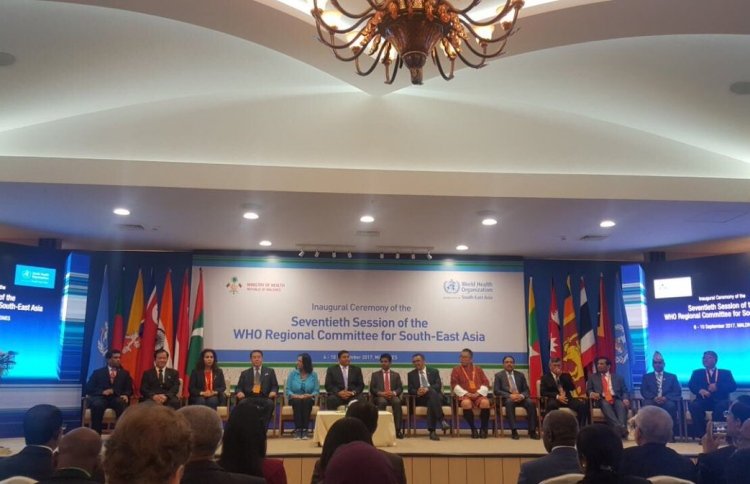Maldives host Seventieth Regional Committee Session of WHO South-East Asia
September 08, 2017 | Friday | News
Building health systems resilient to climate change, improving access to essential medicines for all and intensifying efforts to end tuberculosis are among key issues discussed at a meeting
The Seventieth Regional Committee session of WHO South-East Asia Region, the annual governing body meeting of WHO in the Region, is being hosted by Maldives this year from 6 – 10 September and includes health ministers and senior health ministry officials of the Region’s 11 Member countries – Bangladesh, Bhutan, Democratic People’s Republic of Korea, India, Indonesia, Maldives, Myanmar, Nepal, Sri Lanka, Thailand and Timor-Leste.
First day of the meeting emphasized the need to make health for all a top priority in WHO South-East Asia Region as health ministers, leaders and officials.
At the inauguration of the Seventieth Regional Committee session of WHO South-East Asia, the governing body meeting of WHO in the Region Dr Poonam Khetrapal Singh, Regional Director for WHO South-East Asia Region said, “The challenges we all face are real and complex. We are committed to the achievement of universal health coverage. Every single country is making headway and we have powerful means to measure progress.”
Universal health coverage (UHC) is the best and most powerful means we have at our disposal for changing peoples’ lives through better health, she said, emphasizing how sustained investment in health will ensure hard-won economic progress continues.
WHO Director General, Dr Tedros Adhanom, said “there is nothing better you can do for the people of your countries than to invest in strengthening your health systems. This includes ensuring the right number of health workers with the right skills, in the right places, to give the right care, at the right time. It means ensuring that essential medicines are available, and that people do not have to choose between buying medicine and buying food.”
Abdulla Nazim Ibrahim, Health Minister of Maldives, and Dr Mohamed Shainee, the special envoy of the President of Maldives and the Minister of Fisheries and Agriculture, addressed the inaugural session of the annual meeting being hosted by Maldives this year.
Second day of the meeting recognised the immense and increasing public health risks caused by climate change, Member countries of WHO South-East Asia Region unanimously endorsed the Malé Declaration, committing to build health systems able to anticipate, respond to, cope with, recover from and adapt to climate-related shocks and stress.
“Climate change is happening, and is a risk to public health. Whether from greater severity and intensity of extreme weather events, changes in the spread and abundance of disease-carrying vectors such as mosquitoes, or changes to the physical environment that cause displacement or threaten livelihoods, climate change is already having an impact across our Region. Today’s Declaration demonstrates the commitment of the South-East Asia Region’s Member countries to take effective and immediate action,” Dr Khetrapal said
The Declaration being adopted at the Seventieth Regional Committee session of the WHO South-East Asia Region – the Region’s highest decision-making body – builds on recent initiatives at country, regional and global levels to tackle the public health risks caused by climate change. The Declaration is accompanied by a Framework for Action to be implemented between 2017 and 2022, and calls on UN agencies and other international organizations, development partners, philanthropic agencies, academic and civil society organizations to mobilize human, financial and technical resources for this purpose.










